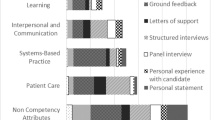Abstract
Psychiatry residency training programs were characterized on four dimensions in a pilot study of seven West Coast schools. Residents and faculty rated their programs on academic versus clinical, community-based versus institution-based, private versus public practice, and biological versus psychological orientation. Faculty and residents from the same schools differed only on the academic-clinical dimension. Significant differences existed between schools on each axis. Variation in ratings on the biological-psychological axis suggests that claims to a “biopsychosocial” orientation may be too broad to be meaningful. This method of dimensional ratings appears appropriate for program assessment and deserves further development.
Similar content being viewed by others
References
Bowden CL, Humphrey FJ, Thompson MGG: Priorities in psychiatric residency training. Am J Psychiatry 1980; 137:1243–1246
Coryell W: Shifts in attitudes among psychiatric restry 1987; 144:913–917
Langsley DG, Yager J: The definition of a psychiatrist: eight years later. Am J Psychiatry 1988; 145:469–475
Toone BK, Murray R, Clare A, et al: Psychiatrists’ models of mental illness and their personal backgrounds. Psychol Med 1979; 9:165–178
Eaton JS, Daniels RS, Pardes H: Psychiatric education: state of the art, 1976. Am J Psychiatry 1977; 134:2–6
Directory of Psychiatry Residency Training Programs. Washington, DC, American Psychiatric Press, 1988
Engel GL: The need for a new medical model: a challenge for biomedicine. Science 1977; 196:129–136
Engel G: The biopsychosocial model and medical education. N Engl J Med 1982; 306:802–405
Van Praag HM: Sodobiological psychiatry. Compr Psychiatry 1981; 22:441–449
Donovan JM: An etiologic model of alcoholism. Am J Psychiatry 1986; 143:1–11
Granger JA: Putting the biopsychosocial model to work in medical education. Journal of Psychiatric Education 1988; 12:3–9
Author information
Authors and Affiliations
Rights and permissions
About this article
Cite this article
Loebel, J.P., Brock, D.M., Scott, C.S. et al. Characterization of Psychiatry Residency Training Programs. Acad Psychiatry 14, 73–79 (1990). https://doi.org/10.1007/BF03341928
Published:
Issue Date:
DOI: https://doi.org/10.1007/BF03341928



